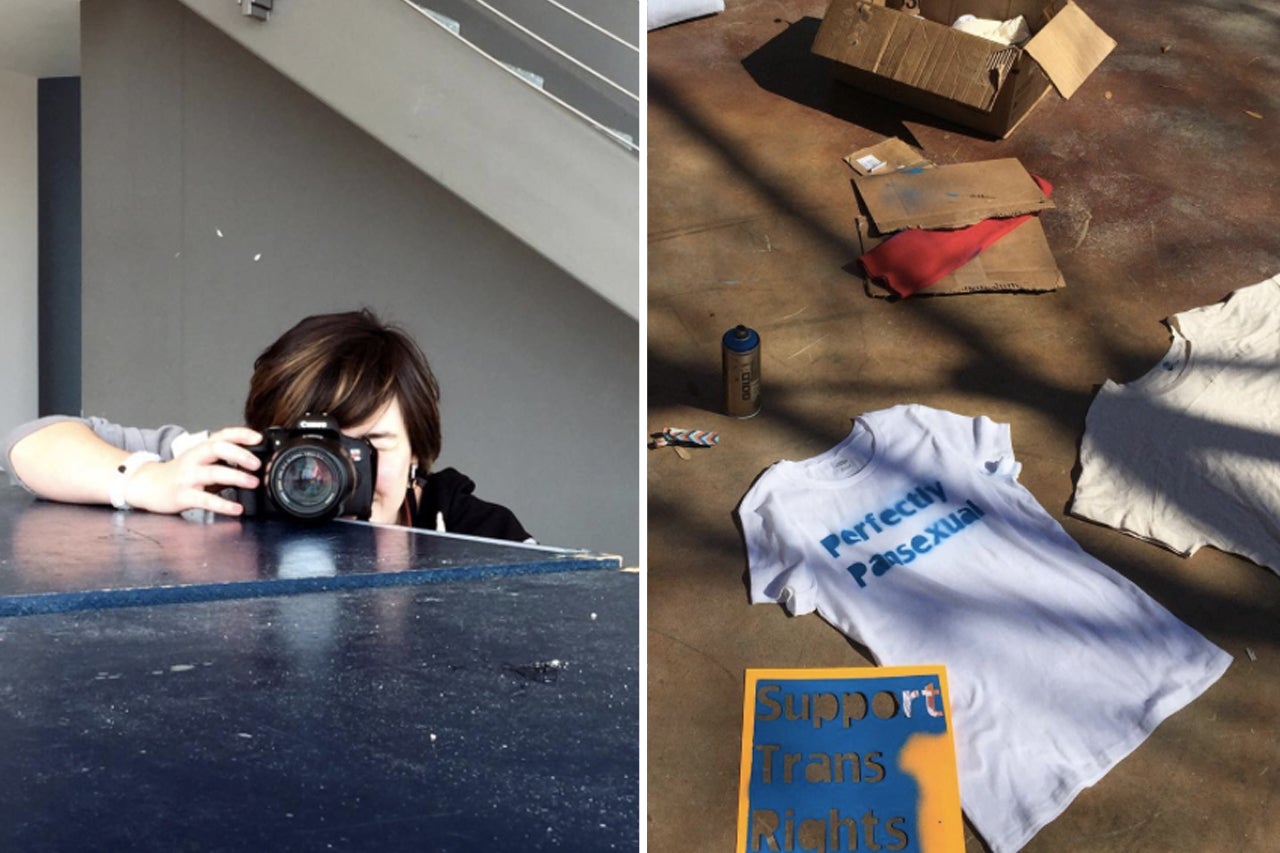By Laura Cergoll
Three College of Charleston freshmen approach Simons Center for the Arts late at night, equipped with black spray paint, machine-cut stencils and a laundry basket full of thrifted T-shirts. They enter a studio, turn up the music and get to work. Their thrift store finds soon bear slogans in blocky text: “Gay is Okay.” “Bisexual Badass.” “Agender Angel.”

Tessa Torgovitsky, a sophomore majoring in Women’s and Gender Studies, works at a photo shoot for Zanas Clothing in Liberty Street Residence Hall. Photo courtesy Nick Weber.
Tessa Torgovitsky, Rowan Dalrymple and Eli Major, now sophomores at the College of Charleston, started Zanas Clothing as a class project in fall 2015 for the Women’s and Gender Studies First Year Experience.
The nonprofit company aims to increase visibility for minority groups, particularly the LGBT+ community, by selling repurposed T-shirts and donating the proceeds to relevant charities. For example, their “Support Trans Rights” shirts benefit the South Carolina Trans Love Fund.
Torgovitsky, president of Zanas, came up with the idea before college. She wanted to start a clothing company that represented people who are often excluded from the world of fashion and advertising. She just didn’t know how.
When Torgovitsky and Dalrymple, who had become friends during orientation, found out they were in the same Intro to Women’s and Gender Studies class, a plan to turn Torgovitsky’s idea into reality took shape.
Dalrymple, consultant and former lead artist for Zanas, had experience decorating T-shirts with spray paint and stencils. Major, who sat near Torgovitsky and Dalrymple in class, rounded out the trio with his business insights and fashion knowledge.

Eli Major, one of the three founders of Zanas, models a “Black Lives Matter” shirt. Photo courtesy Nick Weber.
As Zanas developed, the founders enlisted the help of their friends to model, take photos and do hair and makeup for shoots.
In November, they wrapped up their class project by organizing a public panel on identity, at which Torgovitsky, Dalrymple and several Zanas models spoke.
“It was a true community effort, which is a huge reason we kept Zanas going even after our class ended,” Torgovitsky said.
Zanas wouldn’t be where it is today if it weren’t for the help of professors Lisa Ross and Jennifer Wright, current and past board members and its “amazing volunteers,” Torgovitsky said.
True to the company’s name — which comes from a Russian word that means “to us” — Zanas incorporates feedback from the community, striving to address the lack of representation in mainstream clothing companies.
“When you only work with people who look the same and have the same life story, you’re missing out,” Torgovitsky said.
Over the course of its first year, Zanas collaborated with Meira Bellydance Troupe and the on-campus chapter of the Southern Poverty Law Center. As the company grows, Torgovitsky hopes to work with more student groups to provide an outlet for any voice to be heard and printed on a T-shirt.
Zanas’ commitment to “true representation” extends beyond the slogans in its designs. Every model for the company identifies with the labels celebrated by their shirts and supports the causes they promote.

Zanas Clothing creates “shirts as unique and varied as the human race” by individually painting thrift store finds. No two shirts are the same. Photo courtesy Nick Weber.
“We didn’t want to photograph someone in a shirt that didn’t accurately represent who they were,” Torgovitsky said.
“Sometimes it’s hard to find other people that are openly a part of the LGBT+ community, and Zanas was a good way to bring all of us together,” Dalrymple said. “It’s awesome to be in a big group of such loving and accepting people.”
That love and support proved itself in June after the Orlando nightclub shooting. Zanas was in the middle of a website redesign. The board members put that project on hold to focus on raising funds for victims of the shooting.
Torgovitsky looks forward to expanding the scope of donations Zanas makes and finding more organizations to benefit. The company is in the process of filing paperwork to become a recognized nonprofit.
“I never thought Zanas would be anything more than a thought I jotted down in my notebook, but here we are,” Torgovitsky said. “It’s mind-blowing, and I hope it shows people that they can create something they love from nothing, too.”
Zanas Clothing is currently raising funds for the upcoming year. Find out more about its causes and a chance to win Zanas products on Facebook.

With a little paint, old shirts are transformed into symbols of activism and identity. Photo courtesy Gabriel Powell.
This article was written by Laura Cergol, a senior from Frederick, Md. studying communication and linguistics in the Honors College at the College of Charleston. She is also a William Aiken Fellow and a member of the Global Scholars program.




